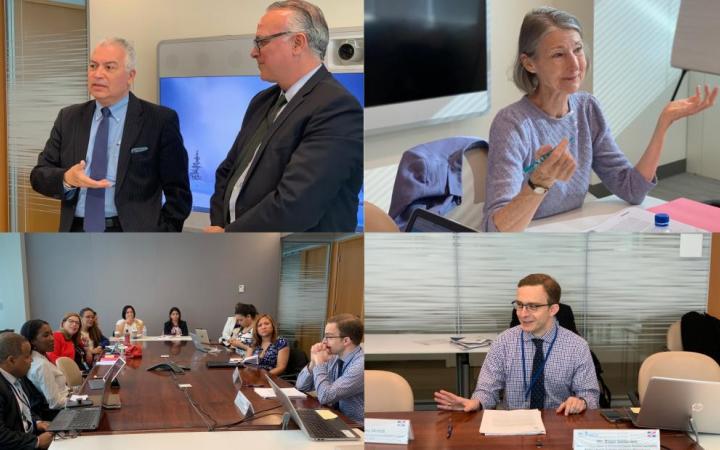24 - 26 October 2018, New York, USA - The United Nations Institute for Training and Research (UNITAR) concluded its training course on “Strengthening Skills and Knowledge in Multilateral Diplomacy: Practical Preparation for Security Council membership” for Dominican Republic diplomats with a three-day-session on the meeting formats, decisions-making process, voting procedures, documents and insights into the Security Council Presidency. The training was from 24-26 October 2018 in the United Nations Headquarters in New York.
The entire training dedicated to the Security Council Membership was delivered to the diplomats by Ms. Loraine Sievers, the former chief of the Security Council Secretariat Branch and co-author of The Procedure of the UN Security Council, Mr. Bojan Stefanovic, the political affair officer in the Security Council practices and charter research branch of the Security Council Practices and charter research branch of the Security Council Affairs Division, and Mr. Davey McNab, the senior political affairs officer.
The last two sessions were led by Ms. Loraine Sievers, Former Chief of the Security Council Secretariat Branch. The first session was opened by Mr. Marco Suazo. Ms. Sievers briefly covered the procedural distinctions between the various meeting formats used by the Council, both formal and informal, with a specific focus on the modalities of briefings and consultations. It also outlined the related procedures with respect to invitations to non-Council Member States or individuals, speaking order, and the different transparency and confidentiality levels. The session continued with a survey of the various formats used by the Council for its outcome documents, with a particular focus on resolutions and presidential statements, as well as notes and letters by the President, press statements, and press elements. The specificity of questions asked by the diplomats demonstrated their eagerness to expand their knowledge and Ms. Sievers gave detailed case studies for clarification.
The second day session focused on the Security Council Presidency and Ms. Sievers provided insights and recommendations on how best to prepare. She covered drafting and negotiating the monthly programme of work, and in particular the planning of thematic meetings and answered highly technical questions. An interesting fact learned included that during press conferences, the representative serving as Council President has the option of replying to questions as President, or in his/her national capacity, or both. She also shared information about the differences between conducting formal meetings, and such informal sessions as closed consultations or informal interactive dialogues.
On the third day of training, Mr. Bojan Stefanovic, Political Affairs Officer in the Security Council Practices and Charter Research Branch of the Security Council Affairs Division, addressed delegates regarding the relationship of the Security Council to the General Assembly. Drawing upon his experience researching, drafting and editing parts of the Repertoire of Practice of the Security Council, a publication providing comprehensive coverage of the Council’s interpretation and application of the United Nations Charter and its own Provisional Rules of Procedure, Mr. Stefanovic looked at Resolutions of the 72nd General Assembly Session, as well as thematic debates regarding the Security Council. Mr. Stefanovic also paid special attention to Article 12, as well as Recommendations by the GA to the SC (Articles 10, 11, and 14), looking at disarmament, practices in sanctions, measures to be taken under counterterrorism items, etc., Under Article 11(2), Mr. Stefanovich looked at the limitation on 11(2) and the peaceful settlement of disputes. He then looked at Recommendations by the Security Council to the General Assembly (Articles 4, 5, 6, and 97), including recommendations to the GA on the admission of States to membership, the suspension of rights and privileges of Member states against which preventive or enforcement action has been taken, the expulsion of UN Members for persistent violations of the principles of the Charter, and the appointment of the Secretary-General.
Mr. Stefanovic further looked at the election of non-permanent Council members (Article 23), the Annual Reports of the Security Council to the General Assembly (Articles 15 and 24), as well as responsibilities of the Security Council Affairs Division. He regarded the election of ICJ Judges, with the next election occurring near the later end of the Permanent Mission of the Dominican Republic to the United Nation’s tenure on the Security Council. To close up, Mr. Stefanovic regarded Note 507, closer coordination on issues on both agendas, different kinds of briefings, interactions with subsidiary organs, and budgetary considerations, and opened the room to questions from delegates.
Mr. Davey McNab, Senior Political Affairs Officer of the Security Council Subsidiary Organs Branch, Security Council Affairs Division, began by readdressing Mr. Stefanovic’s closing statement regarding the famous Note 507. He then went on to further exams the roles and purview of Subsidiary Organs of the Security Council, with special attention to the topic of Sanctions. His interactive training supported continual engagement and questions from the delegates, on issues ranging from functioning of the report of the panel of experts sent to the Subsidiary bodies to the dynamics of the permanent missions and delegations. Mr. McNab addressed a note by the President in 2017 on improving the transparency of subsidiary bodies, improving the selection and preparation of chairs. He regarded the necessity of interactive briefings, exemplar in a Chair holding a briefing for all member states. Mr. McNab then spoke about panels of experts, with particular focus on the politics behind three expert groups based in New York, North Korea, 1267 Al-Qaeda monitoring team, and then non-proliferation, which are supported by the office of disarmament affairs.
Mr. Marco Suazo, Head of UNITAR office in New York, gave the concluding remarks and mutual thanks and appreciation for the support and the participation of the diplomats were exchanged between him and H.E. Mr. Francisco A. Cortorreal.
Photo Credit: UNITAR NYO


